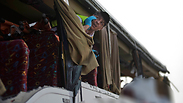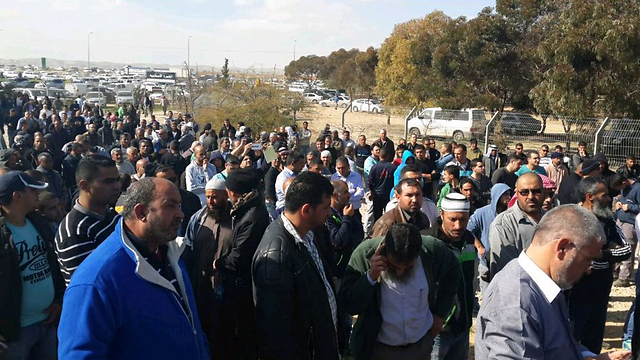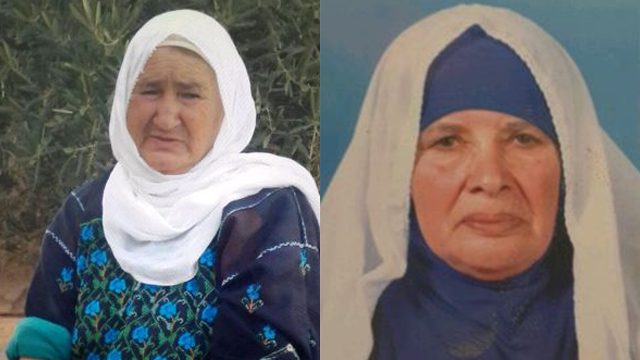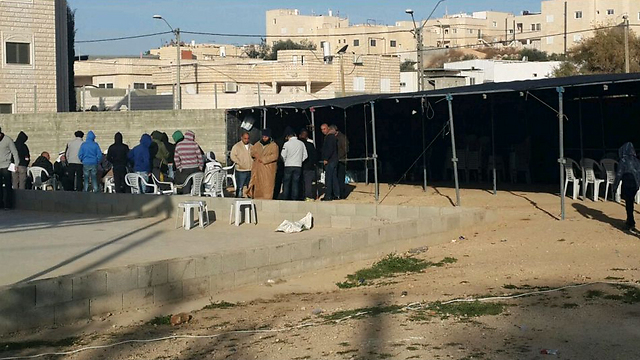
Son of bus crash victim: We're people too, and deserve good roads
Relatives of Bedouin woman killed in crash blame negligence, say reaction would be different if Jews had been killed, as thousands pay respects at funerals.
Families of the victims said the roads they use are subpar and require immediate work. "We have called these roads 'the roads of death' for years," said Ahmed Abu Shahita, who lost his 71-year-old mother, Naama, in the crash. "If the situation stays the same, the next catastrophe will not be far from now," he said.
The accident occurred when a truck carrying agriculture tools collided with a bus full of women returning from prayers.
President Reuven Rivlin spoke with the Hura Regional Council head Muhammad Al-Nabari over telephone on Wednesday morning, and expressed his deepest sadness over the great pain and heavy loss of life in his community.
The president said, "I wish to express through you, my deepest condolences to the families, this is an awful tragedy. Such a human tragedy is beyond comprehension - how in one moment, so many beloved mothers, and grandmothers could be lost. This is a time for unity and coming together, a time when the community must look to embrace those who have lost their loved ones, and help them to look forward."
The mourning tent in Hura was full of people paying respects to the families. Many said the accident could have been prevented if the road had been upgraded as necessary. "I think the writing was on the wall," said Abu Shahita. "This is all because of negligence in expanding and taking care of roads in our area."
Mattab Abu Elkian, who lost his 81-year old mother, Fatma, said he hoped the accident would alert those in charge of the roads that change must occur. "We hope they learn a lesson and understand once and for all that we are also human beings, and we deserve good roads that can save our lives and our children's lives," he said. "We are trying to deal with the current situation. We all miss mother, who was the heart of the family."
Omar Abu Shakra, whose mother died in the accident, remembered how everyone loved the 55-year-old woman. "Her sister sat next to her on the way back. Her daughters were on the other side," he said. They still can't digest the disaster; they even have a hard time visiting the mourning tent. They don't want to deal with the pain anymore. They told us the situation after the accident was horrifying. It's hard to describe the condition of the people who were killed, who were left headless."
Omar said he blamed "the police, the Ministry of Transport and Road Safety, and the truck driver. The Arab sector must fight against the neglect of the roads, which has taken the lives of hundreds of people from the Bedouin Diaspora. It's unacceptable for them to scorn us while in other places they do everything to improve roads. If there were Jews killed, treatment of the issue would be different."
Soroka Medical Center staff was busy treating the injured throughout Tuesday night. Dr. Taufik Elkiyan, a specialist doctor in the orthopedic ward, began Wednesday in the mourning tent for relatives, after a night shift. "When I arrived at the hospital, I realized that my parents and sisters were on the bus. I didn't know yet if they were among the injured or the dead," he said.
"Two of the dead are my relatives. One is like my grandmother, and the other is a cousin and close neighbor. After all the injured people arrived, we were informed that they were among those considered missing, until we got the news. It's an extremely complex and difficult situation. But because I work in the orthopedic ward, I had to treat my relatives as well. It's very difficult, but that's our profession."
The funeral procession began Wednesday afternoon. "Unfortunately, I know Route 31 and drive on it every day," said Elkiyan. "I have also treated many people wounded in that road. It's a road bathed in blood. The car accidents are a war that takes people's lives every day, and especially on that road. The families have many questions, like how the accident happened. We trust the police to judge the guilty parties to the full extent of the law."













